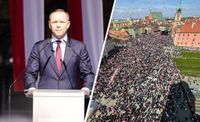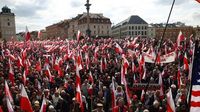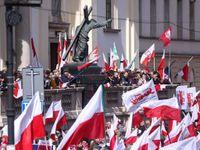On April 12, 2025, a significant march was held in Warsaw to commemorate the 1000th anniversary of the Kingdom of Poland and the 500th anniversary of the Prussian Tribute. The event, which began at 12:00 PM from the Copernicus monument on Krakowskie Przedmieście, attracted a crowd of supporters from the Law and Justice party (PiS), including prominent political figures.
Among those present were Jarosław Kaczyński, the PiS president, and Karol Nawrocki, the party's candidate for the upcoming presidential elections. Kaczyński called on all patriots to participate, emphasizing the importance of the march as a symbol of Polish will, sovereignty, and strength. “I urge all patriots to take part in the march to celebrate the 1000th anniversary of the Kingdom of Poland and the 500th anniversary of the Prussian Tribute, symbols of our will, sovereignty, and the strength of the Polish spirit,” he stated.
Before the march commenced, an attempt was made to break the record for the most couples dancing the Polonaise near the University of Warsaw gate. This cultural performance was intended to showcase Polish heritage and unity, with organizers hoping to present a beautiful image of Polish culture to the rest of Europe.
The march proceeded approximately one kilometer to Zamkowy Square, where participants gathered for speeches and celebrations. Kaczyński and Nawrocki were among those who addressed the crowd. Nawrocki, speaking around 1:40 PM, reflected on Poland's history, particularly the Second Polish Republic, which he described as lasting only two decades but significantly shaping the Polish identity. “That Republic raised a generation of Poles who carried freedom in their hearts during the German and Soviet totalitarianism,” he noted.
During the speeches, Nawrocki stressed the importance of thinking about Poland's future over the next millennium. He remarked, “We must think of the Republic for the next 1000 years. We are merely custodians of this heritage, and we must ensure that we do not surrender our freedom or sovereignty.” His sentiments echoed a broader call for unity and remembrance of Poland's rich history.
As the speeches concluded, the atmosphere remained charged with patriotic fervor. Participants chanted the name of Donald Tusk, the leader of the opposition, prompting a response from him on social media. “I appreciate everyone at the 1000th anniversary of the Polish Crown march for continuously chanting my name. I am particularly grateful to President Kaczyński,” Tusk commented, highlighting the political tensions that continue to simmer in Polish politics.
Leading up to the event, the organizing Committee of Social Initiatives Celebrations, which includes figures like Professor Andrzej Nowak and former Sejm Marshal Marek Jurek, had launched a fundraiser to support the march and related activities. The funds raised would go towards the march, a scientific conference, exhibitions, promotional materials, and historical reenactments, including the Prussian Tribute.
The organizers emphasized the significance of these anniversaries, reminding participants that Poland has a unique history that includes being the first country in Europe to draft a constitution. “This year, we all who identify with Poland celebrate exceptional anniversaries: the 1000th anniversary of the Kingdom of Poland and 500 years since the Prussian Tribute. Despite the shameful pedagogy present in the Third Polish Republic, the facts are undeniable. Few countries can boast such a long and glorious history,” they stated on their official website.
In addition to the march, a mass was held at the Church of the Holy Cross earlier that morning, further marking the day with religious significance. The mass was attended by many participants who would later join the march, reinforcing the day's theme of national pride and remembrance.
The event was not just a celebration but also a reminder of the challenges faced throughout Poland's history. Nawrocki's speech invoked the resilience of past generations, stating, “We survived because of the great workers' Solidarity, but also the solidarity of 40 generations of Poles who created and fought for Poland.”
As the day progressed, the crowd dispersed, but the echoes of patriotic songs filled the air, leaving a lasting impression of unity among participants. The event successfully brought together individuals from all walks of life, united in their love for Poland and its history.
Reflecting on the historical significance of the day, it is essential to note that Bolesław Chrobry was crowned the first King of Poland in 1025, likely on Easter Sunday, April 18. This event marked the beginning of a long and storied history that continues to shape Polish identity today. Additionally, the Prussian Tribute, paid by Albrecht Hohenzollern to King Zygmunt I Stary in 1525, serves as a reminder of Poland's historical significance in Europe.
The march on April 12, 2025, was a moment of pride for many Poles, celebrating their heritage while looking forward to the future. With calls for remembrance and unity, the event underscored the importance of national identity in a rapidly changing world.







